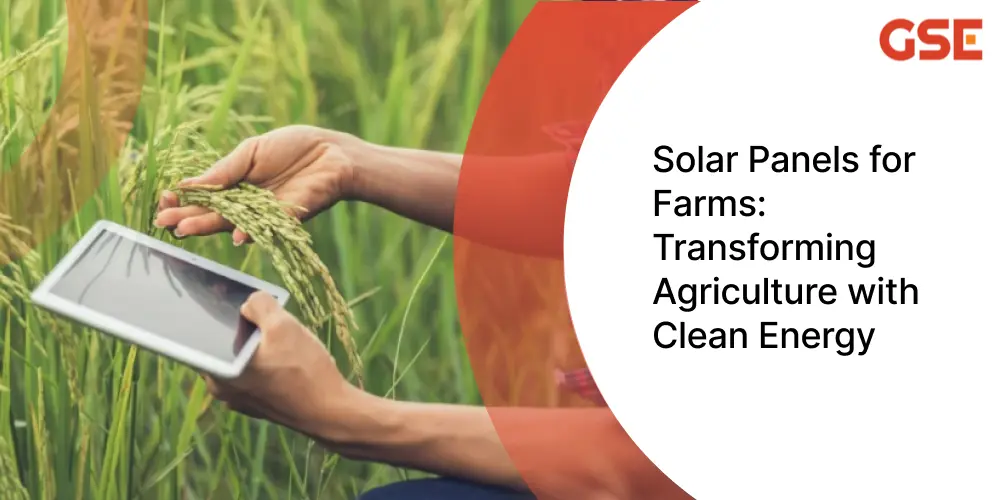500 kW Solar Power Plant Cost in Gujarat: Complete Price & Savings Guide
Nov 26

As the world increasingly embraces sustainable practices, the agricultural sector is adopting innovative solutions to minimize its carbon footprint and enhance energy efficiency. One such innovation is the use of solar panels on farmland, which helps reduce dependence on traditional energy sources while promoting sustainable farming practices. In this blog, we will explore the benefits and applications of using solar panels for farms and how GSE Renewable Energy is leading the way in providing effective solar farm solutions for the agricultural industry.
The concept of sustainable farming has gained significant momentum as the world acknowledges the urgent need to balance food production with environmental conservation. Integrating solar energy in agriculture is a key solution that supports this goal. The combination of solar power for agriculture and traditional farming practices can revolutionize the industry, offering benefits such as a reduced carbon footprint and increased self-sufficiency. This article delves into the synergy between solar energy and agriculture, highlighting the best agricultural solar panels and how GSE Renewable Energy is delivering effective solar farm solutions for the agricultural sector.
The demand for energy in agriculture has surged significantly due to the growing global population and the increased need for food production. This demand, along with the need to power equipment like pumps, generators, and motors, necessitates an alternative energy source that can reduce reliance on fossil fuels. PV solar farms are emerging as a sustainable solution to meet these challenges, providing a reliable source of renewable energy.
Farmers can benefit from solar panels on farmland in several ways. They can lease their land for a pv solar farm, install an agricultural solar system on farm buildings, or adopt agrivoltaics—a method that combines agriculture with solar energy. Agrivoltaics involves growing crops, grazing livestock, or creating pollinator habitats under or between rows of agricultural solar panels. This dual-use strategy enables farmers to “harvest the sun twice,” making optimal use of land that is well-suited for both farming and solar installations. The U.S. Department of Energy’s Solar Energy Technologies Office (SETO) is actively researching the opportunities and trade-offs of agrivoltaics to maximize benefits for farmers.
To effectively integrate solar panels in farms, system designs can be modified to meet specific agricultural needs. For instance, raising the height of photovoltaic panels allows easier access to crops but may increase installation costs due to the need for additional materials. Another adaptation is increasing the spacing between panels to allow more sunlight to reach the crops, making the area more accessible to farming equipment. This modification, however, results in a trade-off between solar energy production and agricultural productivity.
GSE Renewable Energy specializes in creating customized solar farm solutions to accommodate these unique agricultural requirements. Whether it’s raising panel heights or optimizing spacing, GSE ensures that their solar power systems for agriculture are tailored to meet the needs of modern farmers.
The potential for solar energy in agriculture is vast. Agricultural land in the United States alone has the technical capacity to provide 27 terawatts of solar energy, a significant portion of the country’s total solar potential. Despite this, only 0.3% of farmland is projected to be used for solar energy by 2035, indicating a substantial opportunity for growth and expansion of solar plant in farms across the country.
Choosing the right type of solar panel for farm applications is crucial for maximizing efficiency and return on investment. Here are the main types of agricultural solar panels:
Read More: Type of solar Panels
Installing solar panels on a farm offers numerous benefits beyond just generating electricity. Here are some of the key advantages:
The cost of installing a solar plant in farm settings varies depending on the size and specifications of the system. For a 100 kW solar PV system, the cost in India ranges from approximately ₹45 lakhs to ₹65 lakhs. For larger installations, such as a 1 MW to 3 MW solar farm, the cost can range from ₹4.5 crores to ₹15 crores. These investments are beneficial in the long term, considering the savings on energy costs and the potential income from selling surplus energy.
The integration of solar panels for farms is transforming the agricultural sector by providing a reliable and sustainable energy source. From reducing operational costs to promoting environmental sustainability, the benefits of solar energy in agriculture are evident. GSE Renewable Energy is at the forefront of this movement, offering customized solar farm solutions that cater to the unique needs of the agricultural industry.
If you’re considering implementing a solar power system for agriculture on your farm, GSE Renewable Energy can help you find the right solution to meet your energy needs and sustainability goals. Visit GSE Renewable Energy and take the first step towards a greener, more efficient agricultural future.
